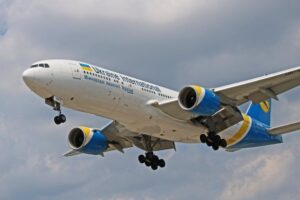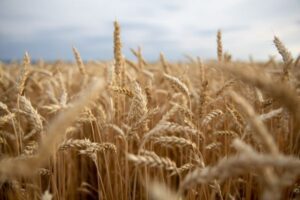
The state budget of Ukraine for the first four months of 2022 was executed with a deficit of UAH 146.6 billion, including the general fund with a deficit of UAH 157.2 billion, with a planned deficit for this period of UAH 317.1 billion, such preliminary results The Treasury Department announced on Monday.
Taking into account its data on the results of three months, in April the deficit of the general fund of the state budget amounted to UAH 89.7 billion compared to UAH 80.6 billion in March, while in February and January there were surpluses of UAH 1.1 billion and UAH 12 billion, respectively. UAH

Ukraine International Airlines (UIA, Kyiv) has reached an agreement on wet-leasing of medium-haul Boeing 737-900 aircraft to the Latvian carrier airBaltic, the Ukrainian carrier said.
From May 1, the aircraft and crews of the Ukrainian airline will begin to be based at Riga Airport to serve the partner flight network, UIA said in a statement on Monday.
At the same time, it is specified that the UIA aircraft will provide connection to a number of European airBaltic destinations. In particular, the plane is booked for flights to Berlin, Madrid, Brussels, Oslo, Copenhagen and other destinations.
According to the press release, four crews of the Ukrainian carrier (28 people in total) will be involved in the operational work of the UIA aircraft on the partners’ routes. The aircraft will operate flights with the UIA corporate color and livery preserved, as well as the crews will work in the original uniform of the Ukrainian airline.
According to the terms of the contract, a service representative of the Latvian carrier will be present on each UIA flight on airBaltic routes.
“We are sincerely glad that our European partners are helping both the Ukrainian state and businesses with a clear, absolutely transparent support for Ukraine. This is especially true amid recent UIA compliance decision not to wet-lease its aircraft to operators who continue flying to Russia. Let this narrow down the scope of opportunities, but it is fully consistent with our morals,” UIA CEO Yevhen Dykhne is quoted in the message.
The deadline for operation of the UIA aircraft in the airBaltic fleet is currently being specified by partners.
Maintenance of Boeing 737-900 as part of the airBaltic fleet will be carried out by UIA foreign contractors.
The Ukrainian airline, as a long-term IOSA certified operator, will ensure operation in accordance with all international operational safety standards.

A study conducted by the CREA center shows that after the start of the war, the EU countries remain the largest consumers of Russian energy resources, according to the British edition of the Financial Times.
Thus, Germany imported hydrocarbons from the Russian Federation for more than 9 billion euros in two months, and Italy – almost 7 billion euros.
This is mainly natural gas supplied through pipelines. At the same time, China, which occupies the third position, buys mainly oil.
In addition, the Netherlands and France, as well as Turkey, remain major buyers of Russian energy resources.

Denmark will soon provide practical reconstruction assistance to Ukraine, Danish Foreign Minister Jeppe Kofod said.
“We will partner and invest in the reconstruction of Ukraine. And I reaffirmed Denmark’s commitment to the restoration of Mykolaiv. We want to move on to more detailed information from Ukrainian partners. But as we speak, we have economic assistance, as well as practical assistance to Ukraine which is already on its way: it will help rebuild your country. Because we must do everything possible to show that such destruction should not happen and that we will overcome it as soon as possible,” Kofod said at a press conference with the Foreign Minister Affairs of Ukraine Dmitry Kuleba in Kyiv on Monday.

Romania has announced a tender for the repair of a broad-gauge railway connecting its Danube river port of Galati and the Moldovan river port of Giurgiulesti in order to transport grain from Ukraine without changing the rolling stock, since exports from Ukrainian seaports are blocked by warships of the aggressor country of the Russian Federation.
On the relevant statement of the Minister of Transport of Romania, Sorin Grindeanu, MP of Ukraine Dmitry Solomchuk (Servant of the People faction) wrote on his Telegram channel on Monday.
“Romania plans to urgently repair the old broad-gauge railway connecting the port of Galati from Giurgiulesti, located across the border with Moldova, so that freight trains loaded with grain from Ukraine can reach the ships without wasting time changing wheels at the border. A tender has been announced,” the MP said. in the social network.
According to Solomchuk, the advantage of the port of Galati is the ability to load both river and sea vessels.
Transportation of Ukrainian grain across the Black Sea remains the cheapest solution, despite the increase in the cost of ship insurance due to the Russian blockade of the Black Sea.
“Minister of Transport Sorin Grindeanu said that this Danube port, together with the port of Constanta, will become one of the key points in the region for the transport of goods and raw materials. Ukraine exports most of its grain to North Africa, and the Black Sea is the shortest route. Alternatives would be through the port Gdansk or Trieste, but the routes would be much longer,” the deputy summed up.
As reported, the Ukrainian and Romanian relevant ministries at the end of March began negotiations on the export of agricultural products from Ukraine through European seaports, including the Romanian port of Constanta.
The first cargo of Ukrainian corn weighing 71 thousand tons since the beginning of the Russian military invasion of Ukraine left the Black Sea port of Constanta on April 29 to the recipient.
The countries bordering Ukraine have responded to its problem with the export of agricultural products and have already significantly simplified the procedures for registering freight traffic or are actively working on it. In particular, Romania, Slovakia, Hungary, Lithuania, Latvia, Estonia, as well as Italy, Turkey, Bulgaria, Georgia, Denmark, Greece, Austria introduced liberal conditions for Ukrainian carriers.
Before the Russian military invasion, Ukraine monthly exported about 5 million tons of agricultural products through the ports of Odessa and Nikolaev, but now, due to their naval blockade by the Russian Federation, it can transport about 500 thousand tons of grain monthly. This leads to a monthly shortfall of about $1.5 billion in export earnings for the country.